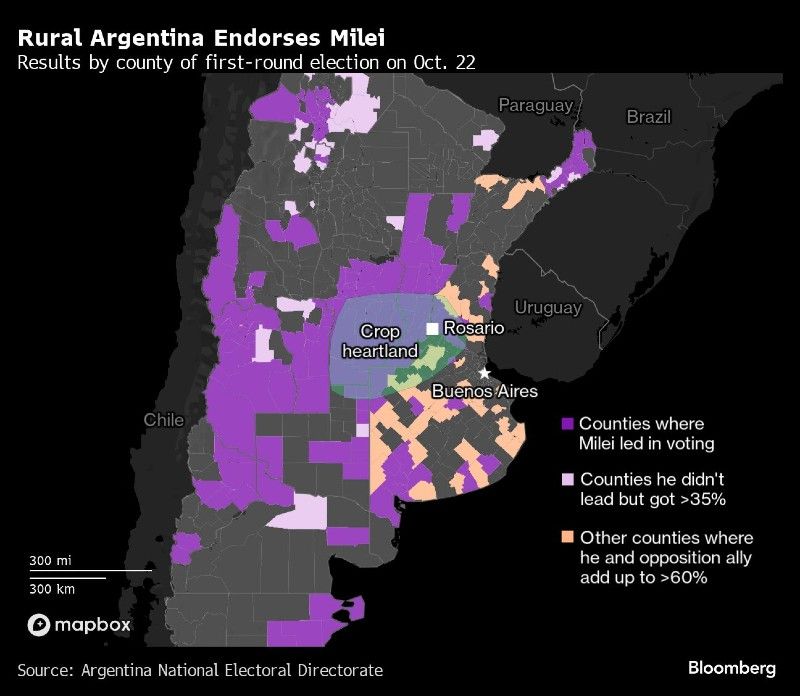Daniel Calaon is like most farmers on Argentina’s fertile plains — a fan of the libertarian maverick Javier Milei and his pledge to unleash the free market and rescue the country’s beleaguered agriculture industry.
Burned by governments that took some US$200 billion from farmers over just the past two decades to pay for bloated budgets, shore up the peso and control inflation, Calaon says he and almost everyone he knows growing soybeans, wheat or corn on the Pampas will vote for Milei in this month’s presidential elections.
“The more the state meddles, the worse it goes,” Calaon, 44, said in a recent interview at a conference in Rosario, a shipping hub in Argentina’s crop heartland. “Right now they’re smothering us. I like Milei’s ideas.”
The agriculture industry — which accounts for 20 percent of gross domestic product — portrays the election as existential: its future is at stake, and with it the fate of South America’s second-largest economy and its ability to compete against Brazil’s farming boom.
Farmers say currency controls, requirements to sell produce locally and steep taxes on what they do send abroad have hobbled them so much that the status quo is untenable.
But they also see so much potential, if only the government would get out of their way.
And that’s what they expect if Milei is successful in catapulting from political obscurity to the nation’s top job in the November 19 run-off vote. Polls show a tight contest with Economy Minister Sergio Massa, who represents the governing Peronists and the policies that farmers abhor.
Milei has won a following among farmers, but also young people and others desperate for change. He points out how horribly things are going — the peso has lost more than 90 percent of its value in four years, the country is headed for its sixth recession in a decade and poverty is increasing — and offers up a radical fix.
He wants to replace the peso with the US dollar, which could be a boon for soy trading; he has vowed to slash export taxes and allow farmers to sell their crops wherever they want; mostly, he says, he wants to unshackle the economy and let market forces rule.
It’s an alluring message in the Pampas — a 300,000-square-mile steppe from the Atlantic Ocean to semi-arid lands in the west — where Milei supporters say all they need to thrive is to be set free from government restrictions.
If they succeed, it would trigger a gush of exports to buyers in Asia and stronger competition for the US and Brazil, potentially transforming Argentine farmers into kingpins in a world where food demand keeps growing. It would also bolster money inflows to Argentina’s dollar-starved economy.

For his part, Massa has said he wouldn’t fall into the trap of Peronists before him who used farmers as a scapegoat for economic woes. His aides point to recent tax cuts for produce like rice, peanuts and wine, some financial help for growers trying to stay in business after the worst drought in 60 years, and a promise to review export tariffs on major crops if he wins.
But protectionism and government largess have nevertheless been key to Massa’s campaign. And in one rural town after another there’s a deep sense that only a clean break from Peronism will do.
“I toil from dawn to dusk, but sometimes it’s only to break even,” said Gonzalo Schulteiss, a 30-year-old crop farmer in Macia, Entre Ríos Province, who’ll vote for Milei. “We have formidable potential, but we can’t tap it.”
Schulteiss needn’t look far to see what fulfilling that potential might look like.
About 250 miles from Macia, agriculture is prospering in Brazil, with plantations being carved out of tropical savannas — despite environmentalists’ objections — and new technology boosting output.
Argentina hasn’t been that dynamic for a century — when rapid expansion of golden wheat and corn fields helped turn the country into one of the world’s wealthiest.
But in the aftermath of World War II, Juan Domingo Perón came to power prioritising the needs of working-class people over business interests, and he doubled down on state intervention. Interference from Buenos Aires in farming came and went over the following decades until the industry stagnated.
By contrast, Brazil’s crop and meat production more than doubled this century, helped by subsidies and supportive policies from friendly lawmakers.
Brazil has also embraced intellectual property rights for seed genetics. In Argentina, that hasn’t happened — paying royalties to use patented technology is anathema to farmers already feeling squeezed — so its soy plants produce much less.
Calaon, the farmer, recalled a bygone era when Brazilian growers smuggled in soybean strains from the Pampas. It was known as “Maradona soy” after the iconic footballer.
“Brazilians would come to our farm trade fairs and they were blown away,” Calaon said. “Twenty years later, it’s the other way around.”
Agribusiness companies like Bayer AG are now loath to develop seeds in Argentina.
“The level of investment today in the US and Brazil in soybeans — oh my God, it’s a hundred times what you see in Argentina,” said Rodrigo Santos, head of Bayer’s crop science unit.
Of course, Argentine farming is still formidable, watched closely by trading desks from Chicago to Singapore.
It’s normally the largest global supplier of soy-based animal feed and soy oil for the food and biofuel industries; the third-biggest exporter of corn, also for livestock herds; and it produces enough beef to slake not only the appetites of Argentines, who rank as the biggest red meat-eaters in the world, but some of the growing middle class in China.
Perhaps the biggest bane for growers are export tariffs: When they send soybeans to Rosario’s ports, roughly one of every three trucks they load is, in essence, diverted to government coffers. Controls that keep the peso artificially strong also greatly curtail revenue and investment.
Milei, who likens taxation to theft, promises to rip away all that intervention — music to farmers’ ears.
“This confiscatory system has to change,” said Javier Mariscotti, a grains broker who’ll vote for Milei. “Unshackle us and watch us grow.”
related news
by Jonathan Gilbert, Bloomberg























Comments